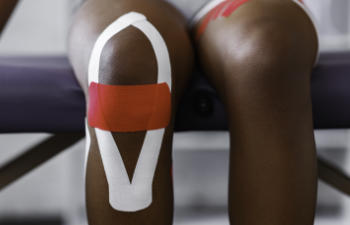
If you have experienced a sports injury resulting from overuse, direct impact, or by generating more force than the body is capable of handling, kinesiology taping can help speed up healing and quickly get you back in the game. Kinesiology tape is a therapeutic tape that contains elastic, cotton, and an acrylic adhesive, which is used to treat pain and disabilities resulting from sports injuries. It is also used to treat non-sport injuries as well. Kinesiology taping works by supporting and stabilizing muscles and joints while the body heals itself. It can also help extend the benefits of soft tissue manipulation for those who have received either a sports massage or deep tissue massage after sustaining an injury. In this article, we will take a closer look at what kinesiology taping entails and why you should consider it.
WHO SHOULD CONSIDER KINESIOLOGY TAPING?
Generally speaking, kinesiology taping is recommended by a sports medicine doctor who believes that such a therapeutic approach may benefit the patient. Chiropractors will typically arrive at this decision after carefully evaluating the patient’s level of pain and the extent of their injury to ensure therapeutic taping is a viable treatment.
Assuming that the patient is a good candidate for kinesiology taping, chiropractors will then determine which tape application should be used. These taping applications often consist of a single “I,” “X,” or “Y” pattern. However, custom tape applications can be used to meet the needs of the patient.
In essence, the purpose of this tape is to reduce pain and inflammation, retrain the neuromuscular system, promote healing and, most importantly, return the body to a natural state of homeostasis. Because of its elasticity, kinesiology tape is capable of being stretched in a variety of ways to better target the muscles and joints that may be causing pain and discomfort.
Your chiropractor will perform a routine physical exam to ensure that an underlying health condition is not contributing to your pain and discomfort. If an underlying health problem is the source of your pain and discomfort, your physician will likely work towards resolving that problem first and possibly using kinesiology taping as an adjunctive treatment. Manual muscle testing, range of motion testing, gait analysis, and other orthopedic tests are generally performed as well. All of these tests are used to evaluate your overall musculoskeletal health and to map out the best course of treatment possible.
WHAT ARE THE BENEFITS OF KINESIOLOGY TAPING?
In addition to promoting healing and reducing pain and inflammation, kinesiology taping can positively impact the skin, fascia, tendons, muscles, ligaments, and joints. It has also been shown to benefit the lymphatic and circulatory system as well. Kinesiology taping can also be paired with other treatments to speed up rehabilitation and to prevent reinjury. If this sounds like a miracle tape, it’s because it is just that, a miracle tape that offers more benefits than what could ever be detailed in this article. In fact, those who have undergone kinesiology taping have extolled the benefits of the procedure and have considered it a godsend.
CHIROPRACTIC CARE AND KINESIOLOGY TAPING
Let’s take a closer look at the chiropractic approach toward kinesiology taping:
PAIN
To resolve pain, a chiropractor will take advantage of the elasticity in kinesiology tape to lift the skin. This process reduces the pressure that is placed on pain receptors and also blocks pain signals that would otherwise travel to the brain.
SWELLING AND INFLAMMATION
Because swelling and inflammation are often associated with sports injuries, chiropractors will generally use kinesiology taping as a means of minimizing pressure on the lymphatics, which are the channels responsible for maintaining the balance of fluids in the body. This process can significantly reduce swelling and inflammation. It is important to note, however, that this aspect of kinesiology taping is not relegated only to sports injuries; it can also be used to help reduce post-surgery inflammation as well.
FASTER RECOVERY
If you play sports, you know that there is nothing worse than being sidelined due to an injury. To help get you back in the game sooner, chiropractors will use kinesiology tape to improve blood flow, which, in turn, improves mobility. Furthermore, the “K” pattern that most chiropractors use in the taping application allows bruises and contusions to heal faster.
HEALING OVERUSED MUSCLES
Lactic acid buildup and overused muscles are unfortunately par for the course when it comes to most sporting activities. As such, many athletes will turn to kinesiology taping for relief. Generally speaking, a chiropractor will apply kinesiology tape directly over the aching muscle to help improve oxygen flow and blood circulation, which not only reduces lactic acid buildup but also improves muscle endurance in the process.
PREVENTS INJURIES FROM BECOMING WORSE
Depending on the severity of the injury, kinesiology taping may allow you to continue playing your favorite sport while you heal. The taping pattern that many chiropractors use can help prevent overstretching or contracting injured muscles too tightly. Although this may limit your natural performance, it is an option for those who would rather not miss a game due to injury.
In summation, there are a variety of benefits that come with kinesiology taping for athletes and non-athletes alike. For example, it can be used in conjunction with pain relievers or combined with massage therapy to further speed up healing times. If you are struggling with inflammation, aching muscles, or any other type of sports injuries, consider trying kinesiology taping.
Posted on behalf of
515 Madison Avenue FL 22A
New York, NY 10022
Phone: (212) 310-0100
Email: sportstherapy150@icloud.com


